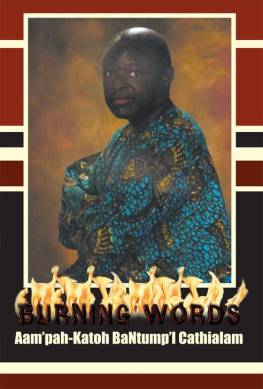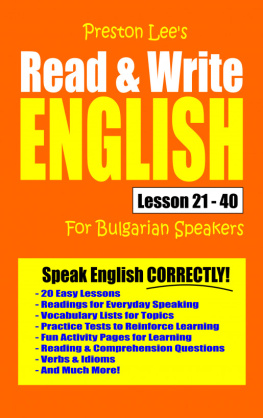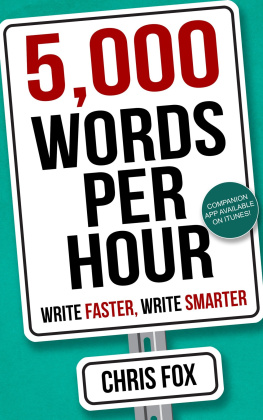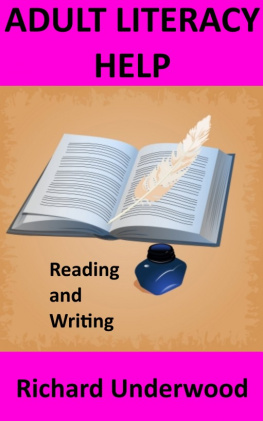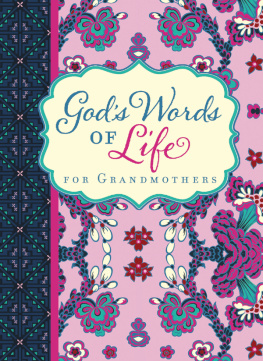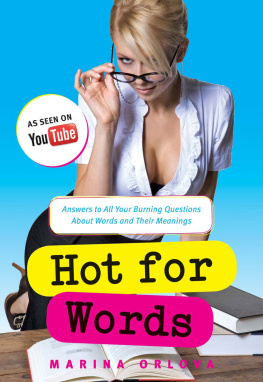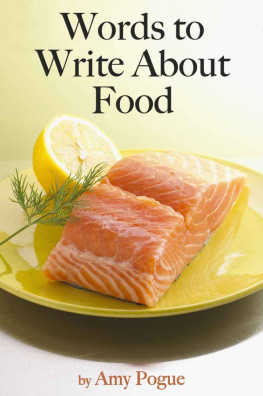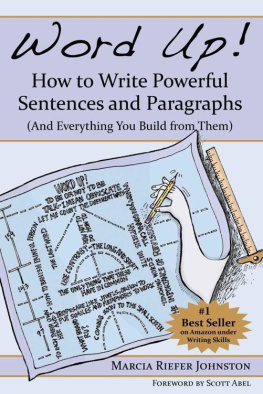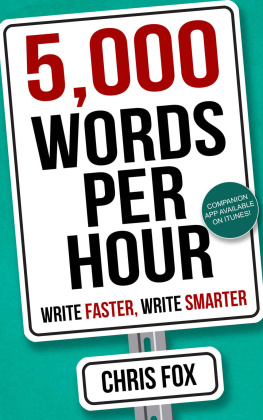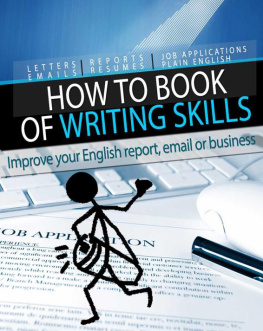Aampah-Katoh BaNtumpl Cathialam - Burning Words And Other News
Here you can read online Aampah-Katoh BaNtumpl Cathialam - Burning Words And Other News full text of the book (entire story) in english for free. Download pdf and epub, get meaning, cover and reviews about this ebook. year: 2012, publisher: AuthorHouse, genre: Detective and thriller. Description of the work, (preface) as well as reviews are available. Best literature library LitArk.com created for fans of good reading and offers a wide selection of genres:
Romance novel
Science fiction
Adventure
Detective
Science
History
Home and family
Prose
Art
Politics
Computer
Non-fiction
Religion
Business
Children
Humor
Choose a favorite category and find really read worthwhile books. Enjoy immersion in the world of imagination, feel the emotions of the characters or learn something new for yourself, make an fascinating discovery.
- Book:Burning Words And Other News
- Author:
- Publisher:AuthorHouse
- Genre:
- Year:2012
- Rating:4 / 5
- Favourites:Add to favourites
- Your mark:
- 80
- 1
- 2
- 3
- 4
- 5
Burning Words And Other News: summary, description and annotation
We offer to read an annotation, description, summary or preface (depends on what the author of the book "Burning Words And Other News" wrote himself). If you haven't found the necessary information about the book — write in the comments, we will try to find it.
Burning Words And Other News — read online for free the complete book (whole text) full work
Below is the text of the book, divided by pages. System saving the place of the last page read, allows you to conveniently read the book "Burning Words And Other News" online for free, without having to search again every time where you left off. Put a bookmark, and you can go to the page where you finished reading at any time.
Font size:
Interval:
Bookmark:
Burning Words
and Other News
Aampah-Katoh BaNtumpl Cathialam

AuthorHouse
1663 Liberty Drive
Bloomington, IN 47403
www.authorhouse.com
Phone: 1-800-839-8640
2012 Aampah-Katoh BaNtumpl Cathialam. All rights reserved.
No part of this book may be reproduced, stored in a retrieval system, or transmitted by any means without the written permission of the author.
Published by AuthorHouse 10/5/12
ISBN: 978-1-4772-7622-8 (sc)
ISBN: 978-1-4772-7620-4 (dj)
ISBN: 978-1-4772-7621-1 (e)
Library of Congress Control Number: 2012918224
Any people depicted in stock imagery provided by Thinkstock are models,
and such images are being used for illustrative purposes only.
Certain stock imagery Thinkstock.
Because of the dynamic nature of the Internet, any web addresses or links contained in this book may have changed since publication and may no longer be valid. The views expressed in this work are solely those of the author and do not necessarily reflect the views of the publisher, and the publisher hereby disclaims any responsibility for them.
Contents
Note I want the reader to know that I personally do the Editing of my manuscripts. This is indeed a very challenging task but it does not keep me up at night. Even though I taught myself the English Language and I only started practicing English at the ripe age of 33, I, for awhile now, have absolute and total control of the language.
Since nothing is ever perfectly done, as you read BURNING WORDS or any other book of mine you may very likely encounter some errors which I have not caught in my Editing. But also keep vivid in mind that what you may consider an error from my part could very well NOT be an error at all!
Now, punctuation-wise , I place a punctuation mark whenever I find it appropriate and I judge which punctuation is more suitable. I do NOT BLINDLY follow the Rule of Punctuations. For instance, I think twice of the point I want to bring across when choosing between a coma (,) which stands as a pause and a semi-colon (;) which implies the end of a thought or clause ; and I may not place a punctuation mark at the end of a quote when you expect me to, I may place this punctuation mark outside of the quote.
Let me make my case in a few words; when you have for example: Blah blah blah, blah blah blah: duh duh duh. as you see, the period at the end of this sentence is placed inside of the quote, this is the conventional way, the way it is done. In reality in this way you have not closed the whole sentence; all you have done is close the quote segment. Now in the following way I suggest: Blah blah blah, blah blah blah: duh duh duh . the whole sentence including the quote segment which is included in the sentence is closed since the period (.) is placed outside of the quote segment.
In the following situation: Blah blah blah, blah blah blah duh duh duh, blah blah blah . the comma (,) placed inside duh duh duh, does not take into account the previous segment. Now in the way I propose: Blah blah blah, blah blah blah duh duh duh , the previous segment is taken into consideration in the clause since the comma (,) is placed outside of the hyphen.
Now, if a sentence is the following way: Blah blah blah duh duh duh. then the period (.) inside of the quote is absolutely valid since this is a totally independent sentence because it starts and ends with a quote. This sentence is not linked to something else. This quote is different to something of the following nature for instance: Blah blah blah: duh duh duh . In this latter case I would place the punctuation mark outside of the quote so to cover the first part which is actually linked to the quote segment.
On the other hand however if I have the following: Blah blah blah: duh duh duh! it is then only fitting to have the exclamation mark (!) or the interrogation mark (?) whichever applies inside of the quote segment since this exclamation or interrogation mark applies exclusively to the quote segment.
You may have noticed that in the paragraph starting with: Let me make my case after a period (.) I type the whole sentence including with the letter t in the in lowercase instead of the capital T, this is because that (misleading) period (.) was not indicating the end of a sentence. The same applies in the following paragraph which starts with: In the following situation : , if you notice, after the first period (.) I type the comma with there again the letter t in the in lowercase instead of the capital T. To name only the first two of such cases.
I may highly likely at moments fail to place the punctuation mark I really wanted to use as I may highly likely also at times fail to use the punctuation marks the very way I suggest, but I hope Ive made my brief point clear enough.
This punctuation method of mine I would consider overall rather complicated. It may seem to you that I dont know what I am doing; but indeed I know exactly what I am doing, which is to place the punctuation mark I judge appropriate and where I judge it appropriate. And if you do come to understand my explanation I would then expect you to embrace my system.
Let me give you an another example; I would type: Blah blah blah. Duh duh duh. Blah blah blah . In this case the quote segment is totally independent; therefore I would place the punctuation mark (the period) inside of the quote.
Let me give you one more example, I would type: Blah blah blah: Duh duh duh, blah blah blah. Blah blah blah; duh duh duh. And the last punctuation mark (the period) is placed outside of the quote segment in order to wrap up everything here which actually starts with the phrase Blah blah blah:
If the last period (.) is placed inside of the quote segment what it means in reality is that the very first part of this whole thing which starts with Blah blah blah: is ignored (left out).
Note_ In a dialogue between parties however I would for instance type the following way:
Bill: Blah blah blah.
Jim: Duh duh duh.
I do place the periods inside of the quotes here because a name by itself in this kind of setting is not to be taken into account. The punctuation mark (the period) in this case above should always stay inside of the quote since the name of the party should not factor in.
I would however type in the following way:
Bill said: Blah blah blah.
Jim replied: Duh duh duh.
Here I do place the periods outside of the quote segments so to cover the phrase segments.
Why do I choose to make things too complex and too much of a headache?! I am just being my true self. What is wrong with being an innovator!
Since this revolutionary punctuation method of mine is something youll have to get used to, I therefore expect you to find it awkward, at least for a while .
I am not going to be humble about it, I am a REAL Genius and a REAL Thinker.
I wrote this book many years ago though it is just published now. The reason Ive still decided to publish it now without any significant alterations is simply because what I said then about some of the topics which could have changed for the better to an extent today remain in reality the way they were if not worse, though I expect many people to strongly disagree with me.
For the most part however the content of this book has nothing to do with so-called current events; therefore I could even have waited to publish BURNING WORDS in the distant future.
This book may be found very harsh at times; the language may also at times be found inflammatory for things are simply, plainly called by their names, or how they were, or the way they had happened. No one is left out! I say it again, no one is left out!
Some of the stories told here illustrate the kind of things, mysterious as well as miraculous, which used to occur in the black mans soil. Several of the stories told in the book are facts which had taken place. Whether one takes these accounts seriously or not because one knows better , cannot change those circumstances what used to happen , or anything for that matter. Whether one believes any of these reports or not, nothing will be affected one way or the other.
Next pageFont size:
Interval:
Bookmark:
Similar books «Burning Words And Other News»
Look at similar books to Burning Words And Other News. We have selected literature similar in name and meaning in the hope of providing readers with more options to find new, interesting, not yet read works.
Discussion, reviews of the book Burning Words And Other News and just readers' own opinions. Leave your comments, write what you think about the work, its meaning or the main characters. Specify what exactly you liked and what you didn't like, and why you think so.

